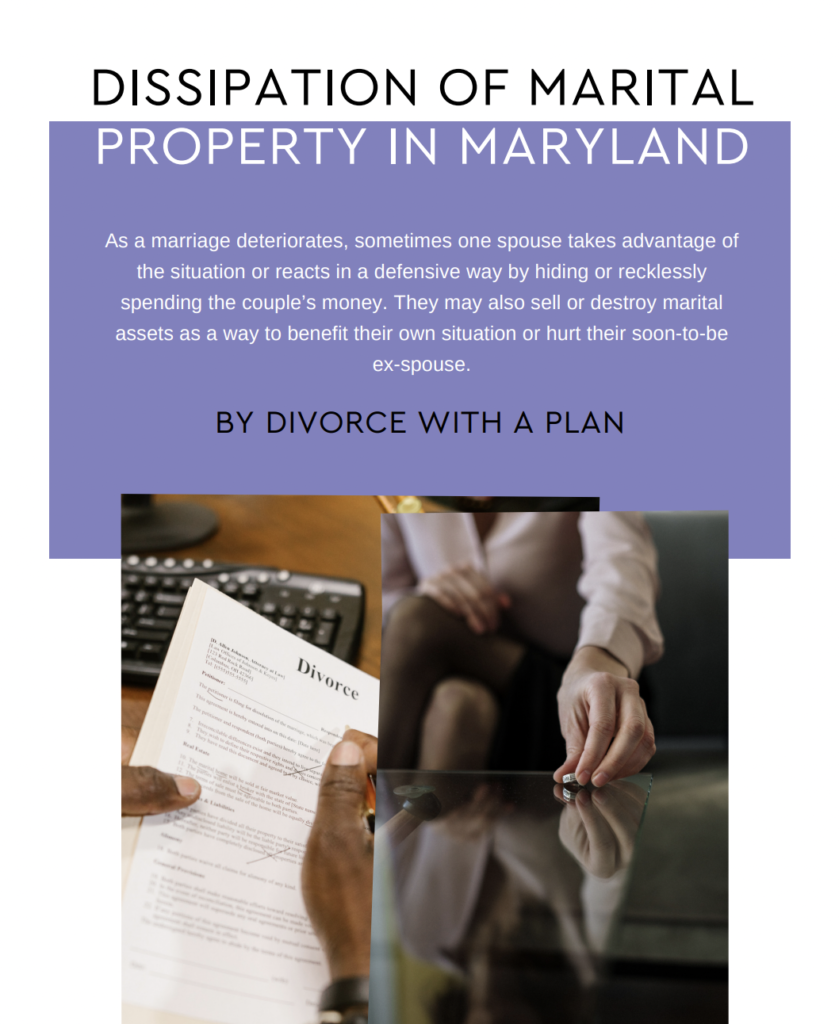Understanding and Addressing Marital Dissipation in Maryland Divorce Cases
This commonly manifests as misusing marital funds intentionally to exclude a spouse from receiving a fair marital property award. Example: using marital funds for mistresses or lovers. When one spouse misuses, mismanages, converts, or otherwise negatively affects property that would have been subject to equitable distribution had it been before the court, it is referred to as marital asset dissipation. This commonly manifests as misusing marital estate or using marital money for the benefit of paramours.
Dissipation of marital assets occurs primarily when one spouse uses them for personal gain or an extramarital affair. The time after a spouse files for divorce is not the only time the couple’s marital assets can be lost. Instead, it starts when the collapse of the marriage that would eventually result in divorce starts to occur.
Common Types of Marital Dissipation
When faced with a dissipation issue, you should first contact an attorney who can use different methods to stop the hemorrhaging of marital funds including injunctions, requesting liens to be placed on real property assets, etc. Your lawyer should be your first port of call. Your spouse’s financial records can be used to track their spending during the marriage, which can be used to support a claim of dissipation of assets.
Any money spent out of the norm may be used as evidence of dissipation during the divorce process. The key is to understand how you can spend your money. Notably, the following factors are considered by the court when determining if spending money rises to the level of dissipating assets.
Any money you spend may be used against you in a dissipation claim by your spouse’s attorney during the divorce process. This includes expenditures made using cash withdrawals, credit cards, checking accounts, mileage, and reward programs.
- Even if your spouse’s private decision that the costs of pursuing the dissipation lawsuit outweigh the benefits of doing so, the court can also change the distribution of funds if you or your spouse dissipated assets that had no monetary value.
- Excessive gambling, drinking, or another reckless spending. The judge’s discretion in dividing marital assets can be influenced by bad conduct that is seen as an economic factor.
- When you or your spouse transfer assets to a relative, a romantic partner, or a third party
- Buying gifts for a significant other almost always necessitates a court-ordered adaptation of the property divide. Additionally, finding out about dissipation enrages the spouse and significantly decreases the chances of coming to an agreement outside of court.
- When business expenses fall within the range of regular operations and competitive compensation, they are typically not seen as dissipation. It is often not regarded as a wrong business decision.
- If you or your spouse approved of a cost during or after the dissolution of your marriage.
- Both partners spend on hobbies or compete too much during the marriage.
- When it comes to retirement or investment accounts, it is particularly crucial to keep them invested, as withdrawing money will result in the court assessing the investments based on the date of sale rather than their potential growth.
- Transferring marital property or transferring marital funds to a trust qualifies as a dissipation of marital property.
If you are thinking about getting a divorce, it can be helpful to look into your spouse’s spending and lifestyle. This is especially true if the reason for the divorce is an affair.
Even though divorce is never easy, you can minimize any difficulties by taking the necessary steps in advance Contact our team of knowledgeable family law specialists, and Divorce With A Plan can assist you in achieving the best possible outcome.
Download our FREE Guide for Marital Dissipation

Marital Dissipation Checklist


